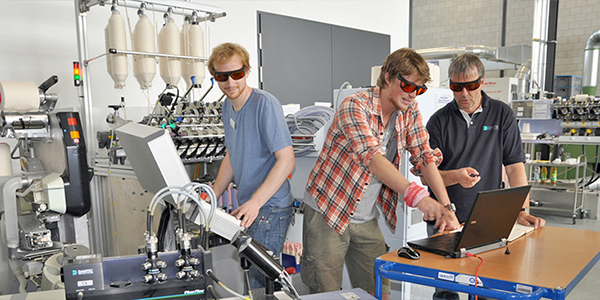Textile Engineering
What is Textile Engineering ?
Textile Engineering courses deal with the application of scientific and engineering principles to the design and control of all aspects of fiber, textile, and apparel processes, products, and machinery. These include natural and man-made materials, interaction of materials with machines, safety and health, energy conservation, and wase and pollution control.
What do students learn in textile engineering course ?
Most of the universities/ institutions offering textile technology course aim to make a student study and understand plant design and layout, machine and wet process design and improvement, and designing and creating textile products. The student is also exposed to many other disciplines of engineering which have a direct or indirect link to textile technology like Mechanical, Chemical, Materials and Industrial Engineering.
Textile Industry in India
- Textile industry accounts for 14% of the total Industrial production, contributes to nearly 30% of the total exports and is the second largest employment generator after agriculture.
- The main markets for Indian textiles and apparels are USA, UAE, UK, Germany, France, Italy, Russia, Canada, Bangladesh and Japan.
- More than Rs.50,000 crore invested in the textileindustry in the last five years.
- Nine textile majors have invested Rs.2,600 crore and plan to invest another Rs.6,400 crore.
- A Vision 2010 for textiles formulated by the government aims at India’s share in world’s textile trade from the current 4% to 8% by 2010 and creation of 12 million new jobs in the textile sector by 2010.
Courses available & Eligibility
- 3 year Diploma course in Textile Engineering/ Textile Chemical Processing Technology (DCTPT ) / Textile Colour and Design.(DTCD) Elig: Pass in 10th / 12th.
- 4 year UG course : BE/BTech in Textile Engg / Textile chemistry / Textile Technology / Textile plant Engineering. Elig: Pass in 12th with PCM atleast 50%.
- 2 year PG, Masters course: MTech in Textile / Post Graduate Diploma in Textile Chemical Processing Technology (PGDTCPT) Elig: BE/B.Tech in Textile.
Study abroad
Plenty of opportunities exist for a graduate in Textile engineering to studying in universities of US which lead to international careers in Textile industry worldwide as well give the right platform for entrepreneurship.
The major contents of the course:
- Textile Engineering Systems & design.
- Mechanics of Fibrous Structures.
- Textile Engineering Quality Improvement.
- Textile Information Systems Design.
- Polymer Engineering.
- Polymeric Biomaterials Engineering.
- Mechanics of Tissues & Implants Requirements.
- Dynamics of Fabric Production Systems.
And much more which is based on the university syllabus and the current.
What you also learn in Textile Engineering ?
- Solid foundation in basic science, mathematics, and engineering science and the ability to apply this knowledge to the solution of problems.
- Demonstrate the ability to use modern tools of engineering to solve problems.
- Design and conduct experiments and analyzing and interpreting data related to problem solving in the areas encompassed by textile engineering.
- Written and oral communication, and the ability to communicate effectively.
- An awareness of the global nature of the textile industry and the modern world.
- A broad educational experience enabling you to pursue careers within or outside of textile engineering.
Colleges offering courses in Textile Technology.
- Government SKSJ Technological Institute, K R Circle, Bangalore – 560001.
- College of Textile Technology, Behrampur, Murshidabad.
- Institute of Textile Technology, P.O. Chowdhar, Cuttack – 754025.
- Indian Institute of Technology, Delhi.
- Government Central Textile Institute, Kanpur – 226020.
- South Gujarat University, College of Engineering & Technology, RK Desai Marg, Surat.
- University of Bombay, Department of Chemical Technology, Mumbai – 400019.
- College of Engineering & Technology, Near Shivaji Park, Akola – 444001.
- Bharathidasan College of Engineering, 9B, Puddukottai Road, Tiruchirapalli – 620020.
- Alagappa College of Technology, Guindy, Chennai – 600 025.
- Bapuji Institute of Engineering & Technology, Shamaur, Road, Davangere – 577004.
- University College of Technology, Hyderabad – 500007.
- Calcutta University, College of Textile Technology, Serampore, Dist. Hooghly – 712201, W. Bengal. and many more… all over India.
Job opportunities
After completing the 4 year graduate program in textile technology / engineering, one can look for entry level jobs under various profiles and work culture. Opportunities exist as
- Process Engineer.
- Quality Control Supervisor-technical.
- Services/Sales Manager.
- Operations Trainee at Labs/plants.
- Process Improvement Engineer.
- Medical Textiles Engineer doing R&D work.
- Dyeing and finishing.
- Industrial Engineer.
And many more roles which are dynamic and have great demand for well trained personnel.





